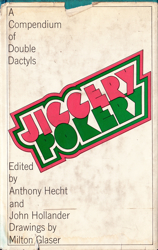
I had intended to post on Naguib Mahfouz's Palace of Desire today, but it sometimes seems that we live in a brilliant, unpredictable universe. And one support for that impression is that David and I received in the mail from a friend of ours who is a big proponent of doggerel verse, a package containing Anthony Hecht's and John Hollander's Jiggery Pokery: a Compendium of Double Dactyls. Previously familiar with Hecht only as the author of the Matthew Arnold satire "Dover Bitch," I was pleasantly and hilariously surprised to make his acquaintance and that of Hollander in such verses as the following (by Hollander):
HISTORICAL REFLECTIONS
Higgledy-piggledy,
Benjamin Harrison,
Twenty-third President,
Was, and, as such,
Served between Clevelands, and
Save for this trivial
Idiosyncrasy,
Didn't do much.
Or this one (by Hecht):
FIRMNESS
Higgledy-piggledy
Mme. de Maintenon
Shouted, "Up yours!" when ap-
Proached for the rent,
And, in her anger, pro-
Ceeded to demonstrate,
Iconographically,
Just what she meant.
Double dactyls have the following rules, as outlined by Hecht and Hollander (a dactyl, for those who don't know, is a three-syllable poetic foot with the first syllable stressed and the second two unstressed):
- The poem is composed of two stanzas, each with three lines of two dactyls each followed by a fourth, four-syllable line that begins with a dactyl;
- The first line must be a double dactyl of nonsense language;
- The second line must be the name of the subject;
- The final lines of the two stanzas must rhyme;
- Somewhere in the second stanza there must be a line made up entirely of a single, double-dactylic word ("iconographically," for example).
Hecht and Hollander also argue that any six-syllable word, once used in a double dactyl, can never be used in a different one, although Wikipedia maintains that only hardcore double-dactyl purists still hold to this requirement. This seems like a lot of rules, but once you start reading these little gems your brain begins to incorporate them almost unconsciously; the double-dactyl line is extremely catchy.
And in fact, between the uproarious Introduction, the delightfully tongue-in-cheek footnotes, and the addictive poems themselves, Jiggery Pokery unexpectedly comandeered my entire afternoon. Of course, the side effect of reading sing-song dactylic verse for hours at a time is that the meter gets horribly stuck in one's head, and one starts noticing double dactyls all over the house and in one's normal speech. In the shower I found myself chanting "Birch bark and chammomile, / Deep Cleansing Wash," and both David and I keep bursting out with examples of promising six-syllable words apropos of nothing in particular. ("Sesquicentennial!" "Homogeneity!") Needless to say, the next stage was to begin composing our own examples; also needless to say, mine were all about books.
THE MOONSTONE
Fletteridge metteridge
Gabriel Betteridge
tells a romance with the
aid of Defoe;
The diamond's locational
Discontinuity's
somewhat assuaged by his
pipe and Bordeaux.
I imagine "discontinuity" has already been used, by someone somewhere in a double dactyl, but I don't specifically remember it from the book. Here's one on my recent reading:
MONTAIGNE
Hop-a-lide, pop-a-lide,
Mike of the Mountainside
'way from his wife, to his
tower confined,
Erstwhile Bordelais
Parliamentarian
Aired his opinions, and
then changed his mind.
They are very addictive! And also surprisingly difficult. It's hard to find a good use for that single-word line when you have so few syllables to work with. Very fun, though. This last one is just about the dorkiest joke ever; the first time my friend Alan started talking about Austrian educational and agricultural innovator Rudolph Steiner (which Alan went through a phase of doing quite frequently), I mis-heard him with funny results.
RUDOLPH'S DINER
Old Donji Kraljevec,
Kingdom of Hungary,
Offers a breakfast that's
truly advanced:
All of the produce grown
Biodynamically;
Waldorf school day care on
hand for the staff.

